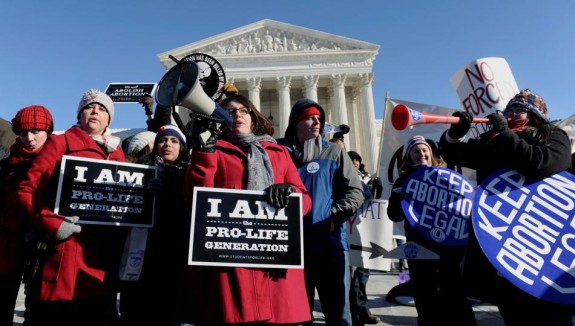With the Supreme Court now solidly conservative, more people are asking that question. The Washington Post offers an analysis — but the bottom line seems to be that the battle for life will not be over if and when the law is overturned:
There’s been a lot of talk among abortion-rights activists and Democratic lawmakers that Brett M. Kavanaugh’s ascension to the Supreme Court might provide a majority to overturn the landmark 1973 Roe v. Wade decision.
Here’s the thing: even if that happened, abortion rights won’t be immediately outlawed throughout the United States.
The truth is the legal framework surrounding abortion rights in the United States is much more complicated, meaning that if the high court acted to overturn Roe, some states would continue allowing women access to abortions, while others may bar them from receiving the procedure — or restrict access to it at various points in a pregnancy and for any number of different reasons.
That means even greater variance in abortion laws across the country depending on whether a state is run by Democrats or Republicans.
Right now, how easily a woman can access an abortion varies dramatically based on whether she lives in a politically red or blue state. Access would become even more segmented if a now solidly conservative high court moved the guideposts on when or how abortion can be restricted.
It’s worth remembering that Roe didn’t guarantee access to legal abortion — the decision states that the procedure can’t be restricted before the point that a fetus is viable. So overturning Roe wouldn’t change much of anything for states mainly run by Democrats who are supportive of abortion rights — they could keep abortion legal within their borders. In fact, nine states have passed laws explicitly protecting abortion rights, regardless of a high court decision.
But in the 26 states where Republicans hold the governorship and control the legislature, stricter abortion bans would probably follow if the court weakens or eliminates the Roe standard.
Four of these states — Louisiana, Mississippi and North and South Dakota — have enacted “trigger laws,” which would go into effect should Roe be struck down. Louisiana’s 2006 law would prohibit all abortions except when the woman’s life is in danger. Mississippi’s 2007 law would also allow an exception in cases of rape. Ten other states have kept pre-Roe abortion bans on the books.
So it’s easy to imagine a scenario in which abortion remained legal in states mainly controlled by Democrats and illegal in other states supervised by Republicans, cleaving the country along the same geographic lines that have divided it in elections.













